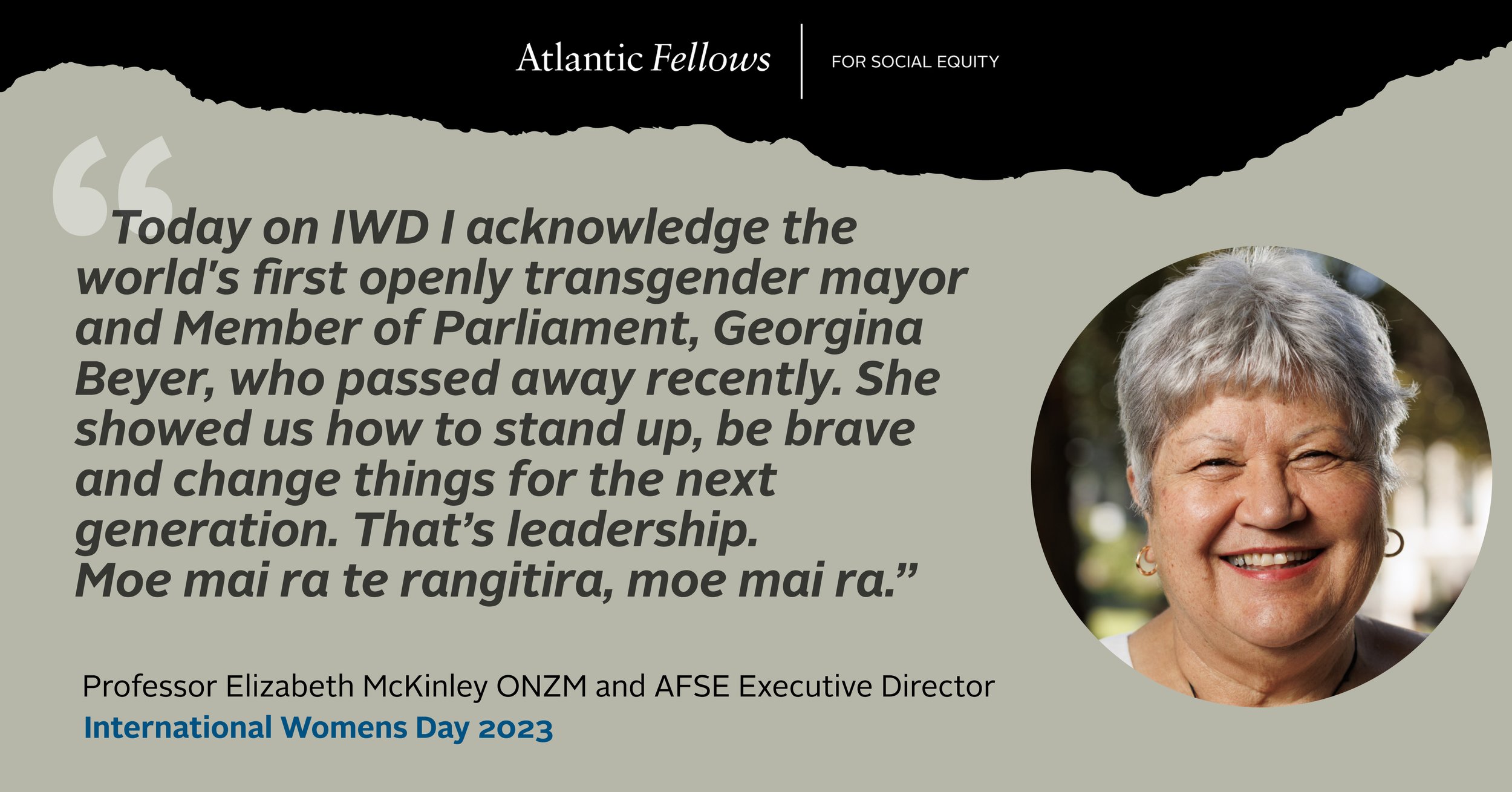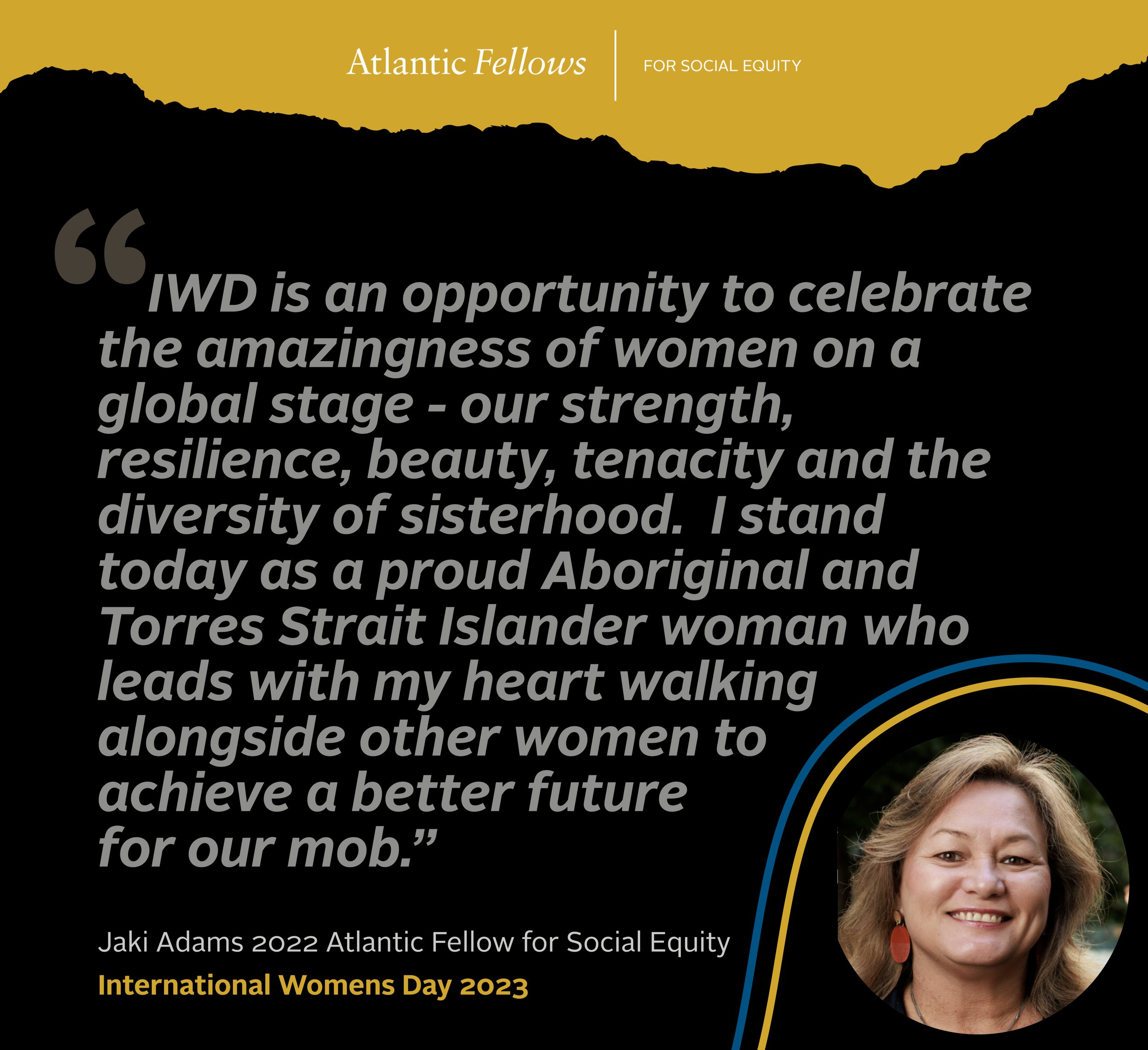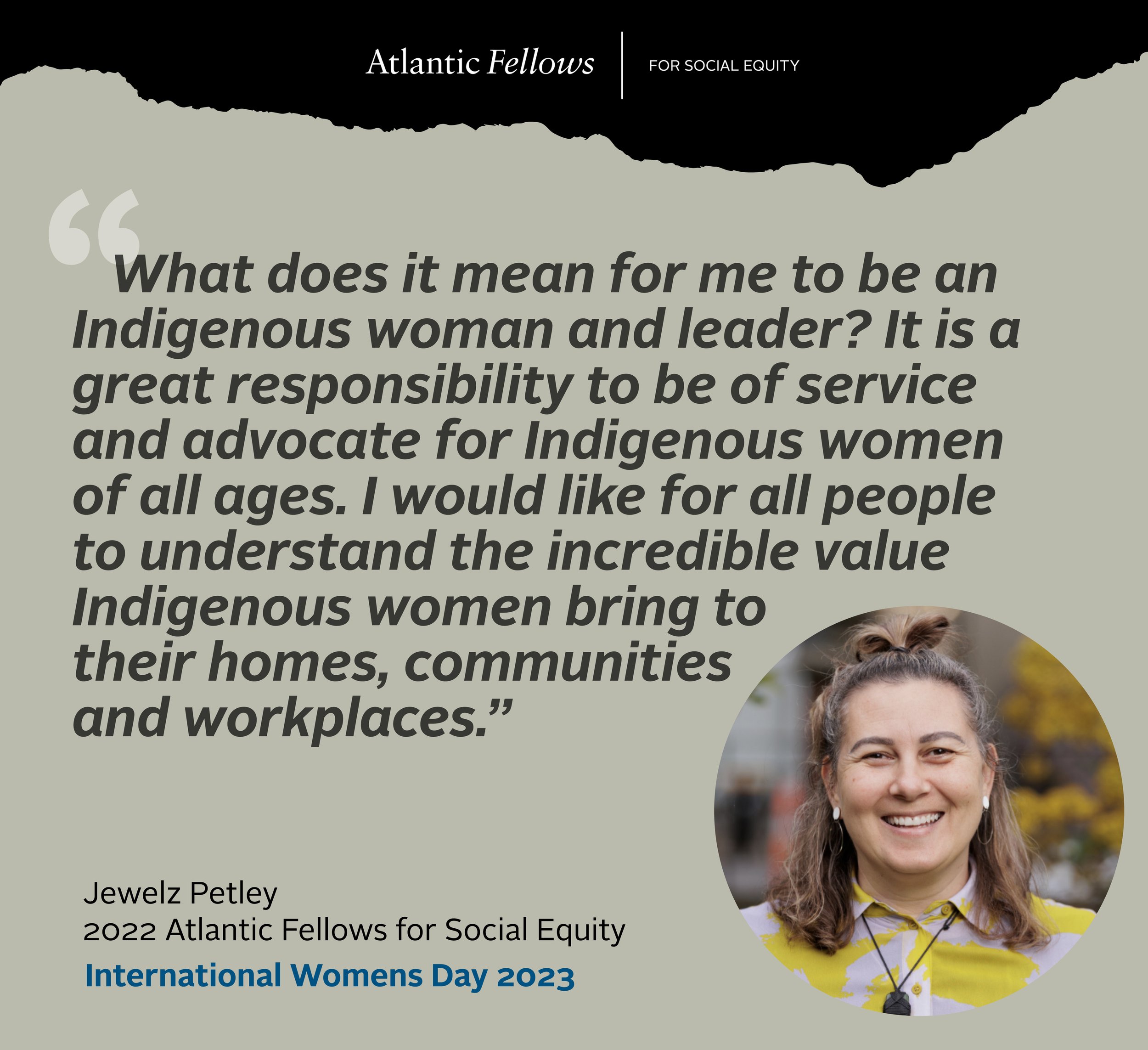Reflections on Indigenous women’s leadership IWD 2023
International Women’s Day is a global movement that supports all those who work for gender equity. AFSE stands with LGBTQI+ women and girls, our Brotherboys, Sistergirls, Two Spirit and trans Mob, our Tiddas and Wahine Toa, who lead our families and communities in pride and joy every day. The right to education, a life free from gender-based violence, and the ability to access affirming healthcare, are fundamental to equity from an Indigenous perspective.
This International Women’s Day, we have asked Atlantic Fellows for Social Equity for their reflections on Indigenous leadership, the matriarchs who inspire them and the things they would like to see change to achieve a more gender equitable world.
For Jaki Adams, an Aboriginal and Torres Strait Islander woman descended from the Yadhaigana and Wuthathi people of Cape York Peninsula in Queensland, International Women’s Day is a day to elevate the voices and visibility of Aboriginal and Torres Strait Islander women.
“International Women's Day is an opportunity to celebrate the amazingness of women on a global stage - our strength, resilience, beauty, tenacity, and the diversity of sisterhood. I am a proud Aboriginal and Torres Strait Islander woman who leads with her heart. It is the best feeling in the world to know that others feel supported, valued, and empowered through me and that others are willing to walk alongside me to achieve a better future for our Mob. A more equitable world starts with an acknowledgement that inequity exists; people and communities are treated differently based on many factors, including race, gender, age and economic status. Elevating the voice of Aboriginal and Torres Strait Islander women and working with allies to take action and be accountable is my way of embracing equity.”
Jewelz Petley (Ngā Puhi and Te Rarawa based in Auckland (Tāmaki-makau-rau) NZ, is a Specialist Advisor for Youth Economy, in the Community Social Innovation Unit at Auckland Council. Here, she works alongside rangatahi (young people), and the community to develop self-determined economic opportunities for Māori youth.
“What does it mean for me to be an Indigenous woman and leader in Aotearoa? It is a great responsibility to be of service and advocate for Indigenous women of all ages. I would like for all people to understand the incredible value Indigenous women bring to their homes, communities, and workplaces.”
For Indigenous women in Australia and Aotearoa, colonisation brings both patriarchy and racism, which erodes women's safety and ways of being. Despite this, our matriarchs and leaders have not ceased to work for our communities and enact social change. From the kitchen tables of our Nannies and Aunties, to the lecture halls of universities and houses of parliament, Indigenous women’s leadership is a pivotal force for self-determined solutions that empower our families and communities.
“Patriarchy arrived in Aotearoa with colonisation, we are a matriarchal people and in some places this narrative has been lost. Our stories are full of Mana Wāhine - female empowerment and strength. I find inspiration through traditional atua wāhine (cosmological women narrative) stories, and the Māori values I see demonstrated in the women around me. I draw a lot of strength from these beautiful examples of Mana Wāhine leadership,” reflected Holly Weir-Tikao (Te Pātaka o Rākaihautū and Ngāi Tahu)
“I feel so blessed to come from a community that has strong Aboriginal women who have led the way for us. I am so privileged to have these amazing women in my life and family, inspiring me to be better and do better for my community,” says Tegan Burns, a Quandamooka woman from Minjerribah (North Stradbroke Island).
Building upon established models of Elders-in-Residence at the University of Melbourne, AFSE Pou provide cultural safety, guidance, and cultural support for Atlantic Fellows during their foundation year. This International Women’s Day, we wish to acknowledge the generous leadership of Dr Jackie Huggins, (Bidjara and Birri-Gubba Juru woman from central and north Queensland, historian, author) and Prof. Linda Tuhiwai Smith (Ngāti Awa and Ngāti Porou) in their role as AFSE Pou. These women have not only contributed significantly to changing the narrative for Indigenous women in Australia and Aotearoa, but they have led by example across many diverse spaces of indigenous knowledge sharing.
"Aboriginal women have our own models of leadership demonstrated through women such as Evelyn Scott, Lowitija O’Donoghue, Doris Pilkington and May Obrien: senior Indigenous women who show true strength. I look up to them and many others and learn from them according to our Indigenous ways of learning and acquiring knowledge,” says Jackie Huggins, one of the AFSE Pou.
Within Indigenous communities, the cultural and societal responsibilities women play are crucial to maintaining the wellbeing of the community. In these especially challenging times of climate change impacts, the coming together of Indigenous women in leadership is more critical than ever, for all people and all cultures to re-evaluate their responsibilities to respect and protect the sacredness of Mother Earth.
“I really love the words of two staunch wāhine (women) from Te Tai Tokerau (Northland, NZ) who are well known as leaders and advocates for the protection of women, children, whenua (land) and te reo (language). Dr Mira Szazsy who asserted in 1993 that ‘women possess an eloquence as good as, if not better than that of the men…That is why I say my mouth will be open even unto my grave’. She was outspoken, courageous, clever and stoic. And Dame Whina Cooper who is famous for exclaiming ‘Take care of our children, take care of what they hear. Take care of what they see. Take care of what they feel. For how the children grow, so will be the shape of Aotearoa’. She was fearless, tenacious and a deeply principled leader. For me, International Women’s Day is a reminder to reflect on mana wāhine (the important role of women) as te whare tangata (the house of people) and te ūkaipō (the sustenance of mankind). May my daughters and granddaughters always stand tall in their mana wāhine.” Prof. Melinda Webber, author and AFSE Co-Director (Aotearoa).



